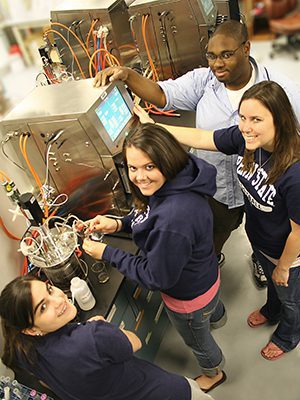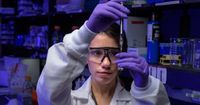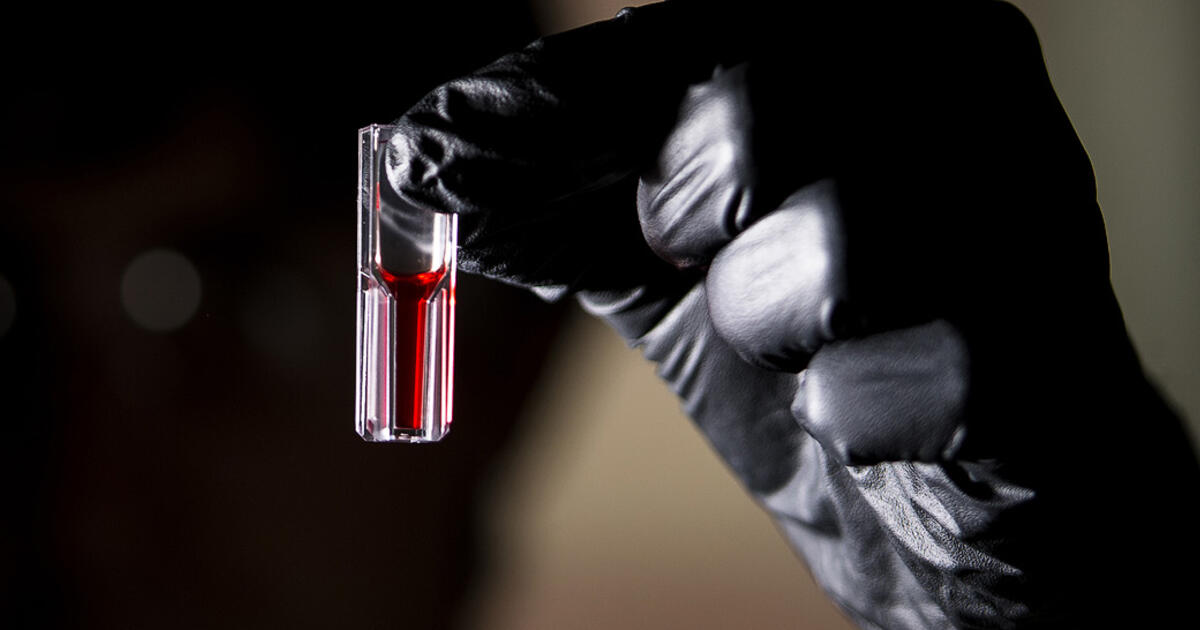Explore web search results related to this domain and discover relevant information.
Bioengineering is the study of applied engineering practices in general biology. Bioengineers’ work often focuses on general theory that can be applied to various areas of natural sciences to solve problems. The field supports several branches that specialize in a specific element of biology ...
However, even if you’re interested in engineering and technology, you may still be hesitant to commit to engineering because you want to work in a profession that directly betters people’s lives. Enter bioengineering and biomedical engineering — two programs that combine engineering principles with environmental, agricultural, and medical expertise to solve biological problems.Bioengineering is the study of applied engineering practices in general biology. Bioengineers’ work often focuses on general theory that can be applied to various areas of natural sciences to solve problems. The field supports several branches that specialize in a specific element of biology and engineering cohesion, such as agriculture, pharmaceuticals, natural resources, and foodstuffs, among others.Biomedical engineers commonly work to solve issues that pertain to the life sciences. Those who work on prosthetics or the emerging field of cybernetics (more formally known as biomechatronics) may also be referred to as biomechanical engineers. Devices like the pacemaker, artificial heart, and cochlear implant are all results of biomedical innovation.Medical and surgical tools such as specialized robotic surgery suites fall under their purview as well. Biomedical engineers also work to advance the efficacy of natural processes through biotechnology, such as tissue regeneration and cell diffusion.

The fields of computing, automation, AI, and data analysis advance faster with each passing year. According to SynBioBeta, a professional network for biological engineers, investment in synthetic-biology companies raised about $4.6 billion in the first quarter of 2021 alone, more than four ...
The fields of computing, automation, AI, and data analysis advance faster with each passing year. According to SynBioBeta, a professional network for biological engineers, investment in synthetic-biology companies raised about $4.6 billion in the first quarter of 2021 alone, more than four times the investment in the same quarter a year earlier.Biosystems: the engineering of cells, tissues, and organs. In both biomolecules and biosystems, recent advances are enhancing our understanding of biological processes, as well as enabling us to engineer biology.Engineering or modifying a living cell can cure or prevent disease; for example, the CRISPR tool allows scientists to edit genes more quickly and precisely than previous techniques. Biomachines: the interface between biology and machines.Biology is self-replicating, self-sustaining, and does not respect jurisdictional boundaries. For instance, genetically engineered gene drives—intended to encourage the replication of one specific genetic trait—applied to vectors that spread disease, like mosquitoes, could have enormous benefits.

This field is supported by scientists with backgrounds in different areas, including biology, bioinformatics, mathematics, and physics. On the other hand, Process Systems Engineering (PSE) focuses on mathematical modeling and computer-aided methods for the design, optimization, and control ...
This field is supported by scientists with backgrounds in different areas, including biology, bioinformatics, mathematics, and physics. On the other hand, Process Systems Engineering (PSE) focuses on mathematical modeling and computer-aided methods for the design, optimization, and control of production processes, typically at a macroscopic scale, considering process-level material and energy balances (Pistikopoulos et al., 2021; Vassiliadis et al., 2024; Daoutidis et al., 2024).PSE finds its roots mainly in the chemical and process engineering communities. Although PSE provides powerful methods for modeling, optimization, and control of complex dynamic systems, its application to biotechnology is often restricted to the macroscopic bioreactor level.Figure 1. Overview of Biotechnology Systems Engineering (BSE) as a unifying framework integrating Systems Biology (SB) and Process Systems Engineering (PSE). The scheme focuses on multi-scale modeling and multi-level control in bioprocesses with plant-wide awareness and under uncertainty.PSE prioritizes the optimal operation of the production facility, with the bioreactor at the core, and extends to plant-wide techno-economic feasibility and life-cycle assessment. In contrast, SB typically focuses on local cellular objectives, such as maximizing the flux through the product-of-interest pathway facilitated by metabolic network engineering.

Bio-Engineer is designed to support other professions through crafting. A large portion of the profession is focused on providing support to Creature Handler through player-crafted pets and the crafting of other pet-related items. Bio-Engineers are required to assemble DNA templates in order ...
Bio-Engineer is designed to support other professions through crafting. A large portion of the profession is focused on providing support to Creature Handler through player-crafted pets and the crafting of other pet-related items. Bio-Engineers are required to assemble DNA templates in order to craft pets and a large part of the profession involves gathering DNA samples from many different creatures.The rest is based on crafting components which can be used to enhance items crafted by other professions. The profession also has the role of producing instant stimpacks which may be used by players to heal health during combat. Playstyles for Bio-Engineer vary greatly due to the wide scope of the profession and incorporate both combat and non-combat.530,500 Medicine Crafting XP (granted for crafting items in Medic and Bio-Engineer)Training Novice Bio-Engineer requires 10,000 Medicine Crafting XP, one branch from Scout and one branch from Medic:
For example, biological engineers design medical devices ranging from glucose sensors to materials and structures for hip replacements, new processes which can clean our air and water, genetically engineer bacteria to produce fuel, pharmaceuticals, or remove toxins, and develop equipment which ...
For example, biological engineers design medical devices ranging from glucose sensors to materials and structures for hip replacements, new processes which can clean our air and water, genetically engineer bacteria to produce fuel, pharmaceuticals, or remove toxins, and develop equipment which harvest and process our food.Given the diversity of the biological engineering discipline, biological engineers find themselves working in a variety of fields including bioprocessing, bioenergy, environment, food production, genetic engineering, and biomedical, while always working toward a sustainable world.Click here to ask a professional Biological Engineer more. Biological engineering is the biology-based engineering discipline that integrates life sciences with engineering in the advancement and application of fundamental concepts of biological systems from molecular to ecosystem levels.The Institute of Biological Engineering (IBE) was established to encourage inquiry, application and interest in biological engineering in the broadest and most liberal manner and to promote the professional development of its members. IBE is the "headquarters" of the biological engineering discipline.


Tackle global challenges in health, food, energy and the environment. Engineer solutions that make a real impact — like cleaner energy, safer food and life-saving medicine. Customize your path and launch a career in biotech, pharma or sustainability to start changing the world.
In our ABET-accredited biological engineering program, learn to design innovative solutions that improve lives and protect the planet. Choose from concentrations in bioenvironmental, cellular and biomolecular, food and biological process, and pharmaceutical process engineering.Pursue a dual degree in biological engineering and biochemistry or pharmaceutical sciences, or tailor your electives toward a future in medicine. Whether you’re aiming for biotechnology, medical school or industry, tailor your path to fit your goals.The priority application deadline for first-year engineering and agricultural and biological engineering (pre) is Nov. 1. Applications received after Nov. 1 for this competitive major will be evaluated based on available space.Program Summary Interdisciplinary engineering... Learn More ... Turn raw materials into the amazing things we use every day and invent the new materials of tomorrow. Explore nanotechnology, biomaterials, aerospace and more as you learn to control metals, plastics, ceramics and composites to create better and more sustainable...
Biomedical engineering (BME) or medical engineering is the application of engineering principles and design concepts to medicine and biology for healthcare applications (e.g., diagnostic or therapeutic purposes). BME also integrates the logical sciences to advance health care treatment, including ...
Biomedical engineering (BME) or medical engineering is the application of engineering principles and design concepts to medicine and biology for healthcare applications (e.g., diagnostic or therapeutic purposes). BME also integrates the logical sciences to advance health care treatment, including diagnosis, monitoring, and therapy.Biomedical engineering has recently emerged as its own field of study, as compared to many other engineering fields. Such an evolution is common as a new field transitions from being an interdisciplinary specialization among already-established fields to being considered a field in itself.Prominent biomedical engineering applications include the development of biocompatible prostheses, various diagnostic and therapeutic medical devices ranging from clinical equipment to micro-implants, imaging technologies such as MRI and EKG/ECG, regenerative tissue growth, and the development of pharmaceutical drugs including biopharmaceuticals.Bioinformatics is an interdisciplinary field that develops methods and software tools for understanding biological data. As an interdisciplinary field of science, bioinformatics combines computer science, statistics, mathematics, and engineering to analyze and interpret biological data.As a science, biomaterials is about fifty years old. The study of biomaterials is called biomaterials science or biomaterials engineering. It has experienced steady and strong growth over its history, with many companies investing large amounts of money into the development of new products.


Biomedical engineers focus on helping healthcare facilities provide high-quality care to patients, which can result in a rewarding career. If you're interested in becoming a biomedical engineer, it's important to understand every aspect of the position, including positive aspects and drawbacks.
Understanding the advantages and disadvantages of pursuing this field can help you choose a career path that fits your goals and preferences and develop the skills necessary to succeed.In this article, we describe what a biomedical engineer does and list the 12 pros and cons of being a biomedical engineer so you can pursue a career path that's right for you.A biomedical engineer is a skilled professional who uses principles of engineering and biological sciences to design and build health devices and systems. Some examples of projects that biomedical engineers may work on include artificial organs, prosthetics, medical instruments or healthcare delivery systems.Besides understanding the engineering process, biomedical engineers are often skilled in fields like biology, chemistry and computer science.Biomedical engineers' daily work often involves researching, designing and creating new biomedical technology. They also test and evaluate the effectiveness of current technology and equipment.Employers also often offer biomedical engineers promotions, which can provide you with the opportunity to increase your earnings.Related: How To Write a Biomedical Engineer Resume (With an Example) As the average age of the country's population increases, biomedical engineers' skills may be necessary to create technology that meets the population's needs.
Students in bioengineering are trained in fundamentals of both biology and engineering, which may include elements of electrical and mechanical engineering, computer science, materials science, chemistry, and biology.
The multidisciplinary undergraduate major in bioengineering is intended for academically strong students who excel in the physical sciences, mathematics, and biology. The structure ensures exposure to the breadth and depth of bioengineering subjects, while providing the necessary foundation in engineering and the physical and biological sciences.The Future of Biology. The Future of Engineering.Bioengineering is a discipline that applies engineering principles of design and analysis to biological systems and biomedical technologies.Examples of bioengineering research include bacteria engineered to produce chemicals, new medical imaging technology, portable disease diagnostic devices, and tissue engineered organs.

Think of a world where the blind can have vision restored with a small implant, a 3D-printed heart waiting to be transplanted saves the patient, or a wearable gadget alerts users of an impending heart attack. This is not science fiction, but rather the reality framed by biomedical engineering in ...
Think of a world where the blind can have vision restored with a small implant, a 3D-printed heart waiting to be transplanted saves the patient, or a wearable gadget alerts users of an impending heart attack. This is not science fiction, but rather the reality framed by biomedical engineering in India and elsewhere.From the development of MRI machines in biomedical instrumentation to applications of biomedical engineering processes applied in health monitors worn on the body, this field blends engineering creativity with medicine and tackles fundamental health problems.If you’re a curious learner or a tech-savvy student planning a research-oriented career, this guide will help you understand what Biomedical Engineering is, its potential, and how MIT-ADTU BIO in Pune is preparing students through a specialized academic pathway to thrive in this evolving discipline.Clinical Engineer: Safeguarding and organizing the clinical engineering department of the hospital by maintaining and optimizing the function of hospital equipment. Biomaterials Engineer: Formulating materials meant to be used in implants or prosthetics.
22 votes, 23 comments. I love engineering but am more familiar with the computer engineering side of things, but lately ive become more intrigued by…
I love engineering but am more familiar with the computer engineering side of things, but lately ive become more intrigued by the bio and biomedical side of engineering and would like to know more about what you all do.My major is bioengineering, but to get into this work you can be a bio major, chem major, chemical engineering major, materials science & engineering, mechanical engineering. I list these bc in my lab we have ppl in these majors. It doesn’t necessarily have to be bioengineering but bioengineering major does mean that this field is easier to access.We also used to have a computer engineering person, they graduated already, but we had another come in interested in joining, but we no longer had a need for that specific expertise so they couldn’t join. Overall I’d say bioengineering, bio, chem, & chemical engineering would be best majors to do this specific field More replies More repliesGrad Student here in Bioengineering with a B.S. in biomedical engineering! I work with stem cells and I am currently creating hydrogel scaffolds of varying stiffnesses. This will influence the stem cells' deposition of collagenases, which then break down the excess collagen present in disease models such as fibrosis!


This was especially surprising ... overall biomass yield. The modified plants also accumulated three times more iron in their leaves and increased production of flavonoids, which are compounds that can help plants fight disease. Consistent with these observations, plants engineered by Brookhaven ...
This was especially surprising because prior studies show that increasing lignin content — and consequently, stiffening cell walls — typically diverts energy from growth and limits the overall biomass yield. The modified plants also accumulated three times more iron in their leaves and increased production of flavonoids, which are compounds that can help plants fight disease. Consistent with these observations, plants engineered by Brookhaven biologists to overexpress the PtrbHLH011 gene exhibited the opposite traits: stunted growth, weaker cell walls, increased sensitivity to disease, and yellow leaves characteristic of nutrient stress.Xie added, “The foundational understanding we established during this study will enable our biotechnology efforts to advance the production of bioenergy and bioproduct feedstocks. “These findings were the result of successful integration of multiple DOE Office of Science facilities and capabilities,” said Xie. For example, collaborators at the Joint Genome Institute measured the levels of gene expression in the engineered plants, and a collaborator at the Molecular Foundry provided insights into how the newly discovered regulatory mechanism adapted as land plants, like poplar, evolved.Biotech Cancer COVID Clinical Trials Diabetes Genetics Infectious Disease Neuro Obesity Women?s Health View all Medicine Channels arrow_right_alt Science · Chemistry Climate Science Dinosaurs DOE Science News Engineering Materials Science Physics Space View all Science Channels arrow_right_alt LifeBrookhaven Lab biologists discovered that a plant protein called PtrbHLH011 regulates key processes in poplar plants, including iron deficiency responses, cell wall biosynthesis, and the production of disease-fighting molecules. Knocking out the gene that codes for this protein boosted plant growth, lignin content, iron accumulation in leaves, and the production of flavonoids — compounds that can help plants fight disease.

If you're interested in a career in engineering, two specialties you can consider are bioengineering and biomedical engineering. Since biomedical engineering is a branch of bioengineering, there are many similarities between the roles and distinct differences.
Learning about these similarities and differences can help you choose a career that suits your skill set and interests. In this article, we define bioengineering and biomedical engineering, discuss the similarities and differences between bioengineering vs.Find bioengineer jobsBioengineering, or biological engineering, uses engineering principles to address biological and health care issues. Bioengineers aim to design new tools, products, or processes to enhance people's quality of life. They may focus on designing specific goods, such as food supplements, pharmaceuticals, biomass-based energy, bio-nanotechnology, or preservatives.Bioengineers typically work in the health care or technology industries. Biomedical engineering, biochemical engineering, and medical engineering are all branches of bioengineering that focus on designing different types of goods.Related: What Does a Biomechanical Engineer Do?If they pass, they can register with their province or territory's regulatory board to become a licensed professional engineer.Related: How to Become an Engineer (With Tips) Bioengineers and biomedical engineers may have role-specific skills that help them succeed in their fields, but they share many of the same soft skills, such as:
Biomedical engineers focus on advances in technology and medicine to develop new devices and equipment for improving human health. For example, they might design software to run medical equipment or computer simulations to test new drug therapies. In addition, they design and build artificial ...
The work of bioengineers spans many fields. For example, although their expertise is in engineering and biology, they often design computer software to run complicated instruments, such as three-dimensional x-ray machines. Others use their knowledge of chemistry and biology to develop new drug therapies.Biomedical engineers focus on advances in technology and medicine to develop new devices and equipment for improving human health. For example, they might design software to run medical equipment or computer simulations to test new drug therapies. In addition, they design and build artificial body parts, such as hip and knee joints, or develop materials to make replacement parts.The following are examples of types of bioengineers and biomedical engineers: Biochemical engineers focus on cell structures and microscopic systems to create products for bioremediation, biological waste treatment, and other uses.Bioinstrumentation engineers use electronics, computer science, and measurement principles to develop tools for diagnosing and treating medical problems. Biomaterials engineers study naturally occurring or laboratory-designed substances for use in medical devices or implants.


In the same field, you can have biomedical engineers designing biomaterials to develop better implants, testing the strength of tissues using biomechanics, growing cells to engineer tissues, and working on brain-computer interfaces for improved prosthetics.” Rosalyn Abbott, PhD, Associate ...
In the same field, you can have biomedical engineers designing biomaterials to develop better implants, testing the strength of tissues using biomechanics, growing cells to engineer tissues, and working on brain-computer interfaces for improved prosthetics.” Rosalyn Abbott, PhD, Associate Professor of Biomedical Engineering, Carnegie Mellon UniversityAs the name suggests, biomedical engineering is a branch of engineering that combines biology, medicine, and engineering to help improve human health. Tasked with developing biomedical equipment, biomedical engineers are also responsible for equipment installation, maintenance, and technical support.There are various subfields in which biomedical engineers might work. Some are involved in improving and developing new machinery, such as robotic surgery equipment, while others create more reliable replacement limbs.These engineers often work as part of a team and are sometimes seen in a supporting or supervisory role. Although the expertise of biomedical engineers primarily lies in biology and engineering, they also design computer software for running instruments, such as a three-dimensional X-ray machine.

Use your understanding of science, medicine and engineering to improve the quality of life for people around the world. Biomedical engineers harness the power of engineering principles to address complex challenges in healthcare. Our students go on to develop innovative technologies such as ...
Use your understanding of science, medicine and engineering to improve the quality of life for people around the world. Biomedical engineers harness the power of engineering principles to address complex challenges in healthcare. Our students go on to develop innovative technologies such as medical imaging equipment, prosthetics, wearable health devices and advanced drug delivery solutions.At our Indianapolis location, jumpstart your career with direct admission to your engineering major of choice. From day one, you enroll in biomedical engineering and follow a core curriculum similar to that of first-year engineering in West Lafayette.To study biomedical engineering in West Lafayette, you will apply to the first-year engineering program. All engineering students in West Lafayette build a foundation for success by completing core first-year engineering curriculum before transitioning to a specialty major in the second year.Apply to begin your journey at Purdue in engineering. ... Ishita Mukadam’s interest in biomedical engineering research started when she scraped her knee at 12 years old on a trip to India from her hometown in Iowa. Ishita watched as her grandmother used turmeric to treat her wound.
Prepare technical reports, data ... submissions, or patent applications. Design or develop medical diagnostic or clinical instrumentation, equipment, or procedures, using the principles of engineering and biobehavioral sciences....
What they do: Apply knowledge of engineering, biology, chemistry, computer science, and biomechanical principles to the design, development, and evaluation of biological, agricultural, and health systems and products, such as artificial organs, prostheses, instrumentation, medical information systems, and health management and care delivery systems.Evaluate the safety, efficiency, and effectiveness of biomedical equipment. Prepare technical reports, data summary documents, or research articles for scientific publication, regulatory submissions, or patent applications. Design or develop medical diagnostic or clinical instrumentation, equipment, or procedures, using the principles of engineering and biobehavioral sciences.Biomedical Engineers develop technologies that help improve the quality of people’s health, or their ability to manage disabilities – and may even save their lives. The field combines biology and medicine with engineering and mechanics— a combination that leads to amazing results.Imaging systems that allow doctors to “see” inside a patient’s organs... artificial limbs, organs, and joints... lasers for surgery... devices that automate insulin injections… computer simulations to test new drug therapies… Biomedical engineers designed all of these, and also keep them running.
Biological engineering employs knowledge and expertise from a number of pure and applied sciences, such as mass and heat transfer, kinetics, biocatalysts, biomechanics, bioinformatics, separation and purification processes, bioreactor design, surface science, fluid mechanics, thermodynamics, ...
Biological engineering employs knowledge and expertise from a number of pure and applied sciences, such as mass and heat transfer, kinetics, biocatalysts, biomechanics, bioinformatics, separation and purification processes, bioreactor design, surface science, fluid mechanics, thermodynamics, and polymer science.It is used in the design of medical devices, diagnostic equipment, biocompatible materials, renewable energy, ecological engineering, agricultural engineering, process engineering and catalysis, and other areas that improve the living standards of societies.Examples of bioengineering research include bacteria engineered to produce chemicals, new medical imaging technology, portable and rapid disease diagnostic devices, prosthetics, biopharmaceuticals, and tissue-engineered organs.Bioengineering overlaps substantially with biotechnology and the biomedical sciences in a way analogous to how various other forms of engineering and technology relate to various other sciences (such as aerospace engineering and other space technology to kinetics and astrophysics).Working with doctors, clinicians, and researchers, bioengineers use traditional engineering principles and techniques to address biological processes, including ways to replace, augment, sustain, or predict chemical and mechanical processes.


Bioengineering blends the technical skills of engineering with expertise in biological science, resulting in a versatile skill set that applies to many industries. Whether you're a recent graduate or considering this degree specialization, researching available job opportunities can help you ...
Bioengineering blends the technical skills of engineering with expertise in biological science, resulting in a versatile skill set that applies to many industries. Whether you're a recent graduate or considering this degree specialization, researching available job opportunities can help you find a fulfilling position.Bioengineering degree jobs can include a range of positions in a variety of industries. Your choices may depend on your degree concentration, your career goals and your working style or preferences. Industry options can include education and academia, engineering, technology, medical science and business.National average salary: $75,020 per yearPrimary duties: A consultant in biotechnology conducts assessments and provides advice about various biological and engineering matters. Working in public policy, nonprofit and the private sector, they conduct in-depth research and generate experiments in order to gather necessary data.National average salary: $113,978 per yearPrimary duties: A bioprocess engineer analyzes, develops and improves the systems used to manufacture biological processes. Through careful experimentation and observation, they work to improve process efficiencies, product quality and employee safety conditions.
The bioengineering program at Oregon State is a leader in creating innovative health solutions. Our interdisciplinary faculty work to advance sustainable health solutions while addressing global health challenges. With a unique partnership with Oregon Health & Science University and the University of Oregon, our impact on human health is amplified statewide. Our goal is to train the next generation of engineers ...
The bioengineering program at Oregon State is a leader in creating innovative health solutions. Our interdisciplinary faculty work to advance sustainable health solutions while addressing global health challenges. With a unique partnership with Oregon Health & Science University and the University of Oregon, our impact on human health is amplified statewide. Our goal is to train the next generation of engineers who are inspired to tackle real-world health challenges.Explore Oregon State University's Bioengineering program, where innovation meets healthcare. Discover cutting-edge research and hands-on learning opportunities.Bioengineers work to create new and better methods for improving human health, from paper-based diagnostic tests to 3D-printed artificial organs.Lindsay Benage is inspired to find biomedical solutions for people living with chronic orthopedic injuries.






